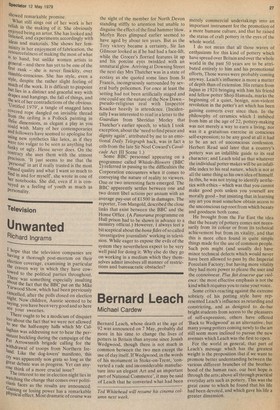Bernard Leach
Michael Cardew
Bernard Leach, whose death at the age of 92 was announced on 7 May, probably did more in his time to change the,. lives of potters in Britain than anyone since Josiah Wedgwood, though there is not much in common between the two men except the use of clay itself. If Wedgwood, in the words of his monument in Stoke-on-Trent, 'converted a rude and inconsiderable manufacture into an elegant Art and an important part of National Commerce', it may be said of Leach that he converted what had been
Ted Whitehead will reswne his cinema column next week.
merely commercial undertakings into an important instrument for the promotion of a more humane culture, and that he raised the status of craft pottery in the eyes of the whole world.
I do not mean that all those waves of enthusiasm for this kind of pottery which have spread over Britain and over the whole world in the past 50 years are to be attributed entirely to him and his promotional efforts, Those waves were probably coming anyway. Leach's influence is more a matter of depth than of extension. His return from Japan in 1920 bringing with him his friend and fellow potter Shoji Hamada, marks the beginning of a quiet, benign, non-violent revolution in the potter's art which has been gaining converts ever since then. In the philosophy of ceramics which I imbibed from him at the age of 22, pottery-making was not merely a way to earn a living, nor was it a gratuitous exercise in conscious self-expression; to be any good at all it had to be an act of unconscious confession. Herbert Read said later that a country's pottery was an infallible guide to its real character; and Leach told us that whatever the individual potter makes will be an infallible index to his real nature, which is not at all the same thing as his own idea of himself. In this, he was not trying to identify aesthetics with ethics — which was that you cannot make good pots unless you yourself are morally good — but insisting that in learning any art you must somehow obtain access to the unconscious tap root from which beauty and goodness both come.
He brought from the Far East the idea that the beauty of pottery comes not necessarily from its colour or from its technical achievement but from its vitality, and that this is more often found in quite simple things made for the use of common people. Such pots might (and usually do) have minor technical defects which would never have been allowed to pass by the Imperial Porcelain Factory; but having more vitality they had more power to please the user and the connoisseur. Plus fait douceur que violence: the most effective emphasis is not the kind which requires you to raise your voice.
Some critics reacting against the extreme sobriety of his potting style have represented Leach's influence as retarding and constricting, and as designed to de-bar bright students from access to the pleasures of self-expression; others have offered 'Back to Wedgwood' as an alternative; but many young potters coming newly to the art still seem more inclined to pursue the new avenues which Leach was the first to open.
For the world in general, that part of Leach's message which has the greatest weight is the proposition that if we want to promote better understanding between the various different branches of the brotherhood of the human race, our best hope is through the arts; above all through practical everyday arts such as pottery. This was the great cause to which he found that his life had been devoted, and which gave his life a greater dimension.


































 Previous page
Previous page